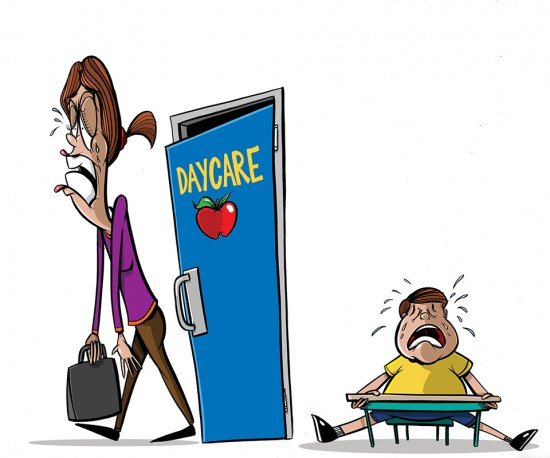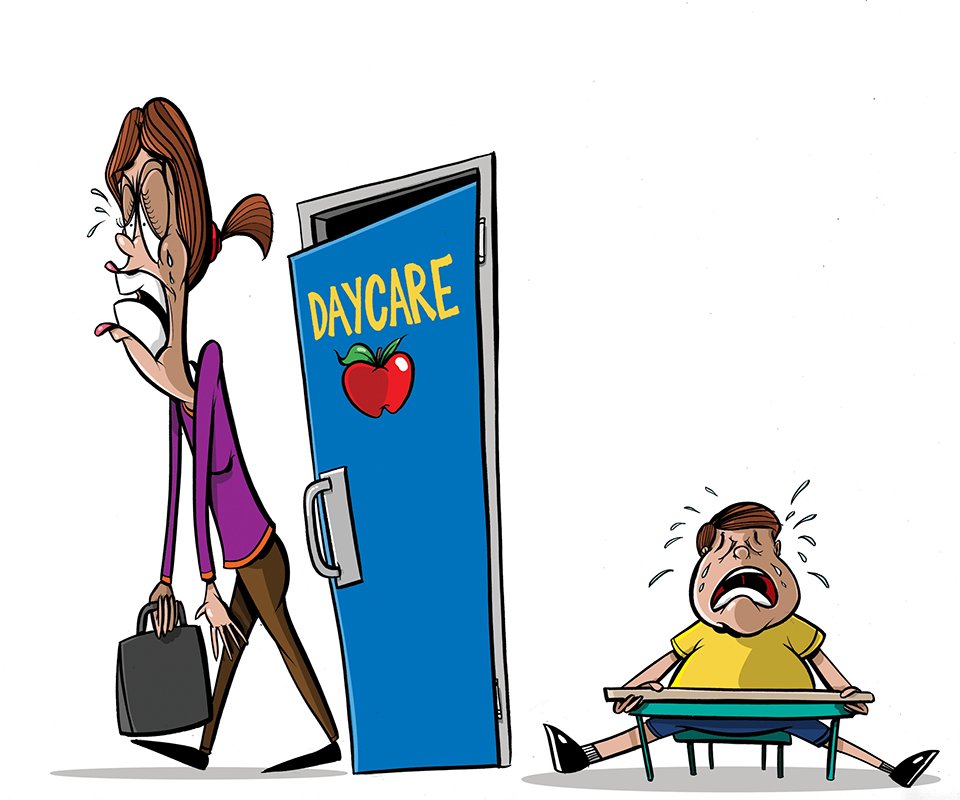Transitioning my son into his first nursery program was a hard-fought, epic milestone. It was also a pretty big deal for him.
By Susan Anspach • Illustration by Matt Mignanelli

Before it got better, it got worse.
On the Monday and Tuesday of my son’s first full week of day care, he only broke down crying at the facility. It was fine, the staff promised me. Everyone went through it; he only cried for five minutes after I’d gone.
On Wednesday, I couldn’t get him out of the house.
This was his first full week. We’d actually started attending for a few days the week prior, but only one hour a day. I stayed with him that hour, walking circles round the playroom, exclaiming delight over every half-crayon, toy train and board book—delight that in other contexts would be considered manic. Before that we had had orientation, when we’d toured the lunchroom. The diaper station. The coat rack. The cubbies. When we’d made sure my son liked the snacks the day care served, that he had positive impressions of the paint trim over the sinks.
We could have hypnotized him. Short of that, there was no kinder way to ease him into day care—which, I thought, made the hideous difficulty of the thing at least doubly unfair.
Some days it feels like I enrolled myself in this day care. I brush my hair before drop-off. I snap to for the teachers. All of us new moms do. The new moms—you can pick us out a mile away. They’re nice ladies, from what I can tell. We’re getting to know one another, little by little, from our shy glances and chewed-to-the-quick fingernails. On one of our shared early days, the staff had us new moms step out of the playroom to make puppets for our kids. It was quite nice, actually. They gave us lots of yarn and hot-glue sticks. They served us cookies and apple juice while we worked. By the end of it, I was really absorbed; my puppet had a blond wig and buttons I’d sewn on with a needle and thread. Afterward we showed off our work to much praise, though now no one cares a fig for those puppets, least of all our 2-year-olds.
The way my son cried the first time I left was nothing compared to what I did back at home, something between wailing and the moans of Niobe. I managed to pull it together for pickup, where I stood in the doorway, sunglasses masking my red eyes, agreeing to come back the next day, privately assured of my new plan to homeschool.
Someone—a neighbor my same age, but with a 7-year-old and thus light years wiser—told me the transition would take about two weeks. I clung to two weeks like a raft in a storm. Two weeks became a chant in my head on the squalling car rides each morning. “Two weeks,” I mouthed to myself in the mirror before bed. Then, when two weeks came and went and he showed no signs of improvement, I came to the natural conclusion: that my son was defunct and our attempts at day care were doomed.
It did get better. Eventually. I won’t tell you how long in case you’re a newbie prone to despair, like me. I will tell you there are weeks I think day care takes better care of my son than I do. Every day features a balanced lunch, a snack break with songs, a small library of books in Italian and Chinese. They never run out of patience or ideas. The staff is uniform to the point of seeming French; they are slim, brunette and draped in white aprons. Of all of them, I like Laura best. She wears the apron and brown hair but also big pearl earrings so I can pick her out fast. At pickup she supplies me with the minutiae of my son’s past three-and-a-half hours, providing enough detail that I don’t have to ask for it and be reminded of my own nitpicking lunacy.
A month passed. Things settled down a bit, and the day care called us in for parent-teacher conferences. Part of me knew how ridiculous that was; another, higher-maintenance part of me told that first part to stuff it. Laura and I talked about my son for a full three minutes before the conversation veered toward, and remained firmly centered on, me. I loved my parent-teacher conference; it was the best free 15 minutes of therapy I’ve ever had. Afterward, I told Laura I was sorry, that I was just nervous. This was our first day care. I was having a hard time letting go. I could tell it took a lot for her to hold her surprise.
These days, Laura tells me my son’s thriving. And I can see that he is, from the times I get there for pickup and he doesn’t spot me right away. My son’s learning gymnastics. He’s learning new languages. This is the Harvard of day cares; the wait list is a telephone book. I’ll never know how we got in.
This is how exclusive our day care is: It’s off-limits to me—not by official mandate, but it’s understood. Only the kids and the staff ever set foot on the playground; in the mornings, Laura scoops my son from my arms before I can set foot through the door. The thinking is good; compartmentalizing has helped us both with the transition. I just wouldn’t say no to a go on those monkey bars.
The blips and snips I remember from my own first year at day care all center on my teacher, Miss Patty, who lives in my memory as a celestial being with large brown curls illuminated with soft lighting. My parents say I loved day care with her and that she snuck me third helpings of macaroni for lunch. Conversely, my husband never had day care. His mother kept him home until kindergarten, where, on the first day, he staged a hunger strike and chucked a rock at a girl’s face. He remembers that day, he says—remembers crying so hard he couldn’t breathe. He told me this on that first painful week of our son’s, to demonstrate that if he turned out OK, our kid would, too. I fought to see past the stress-clots clouding before my eyes to his meaning, which was good, and slowly reeled in my own plans for a rock.
We’re on this train now, and I’m not getting off it. Last week my husband asked if I wanted to check deals for spring airline flights and I told him we couldn’t because it would mean missing day care. I’m zero parts interested in a family vacation if it means regressing and having to do any part of this over again. Our day care accepts children through 5 years old, and what they don’t know is they could triple their rates every one of these next three years and we’d still pony up.
I haven’t figured out yet what we’ll do when that fourth year rolls around. Buying Laura out to come work as our private home tutor has crossed my mind. I think I could offer her a pretty sweet deal: flexible hours, no apron. Her health insurance would cost us, but I like the idea of all that free therapy.
( December 2015 )





